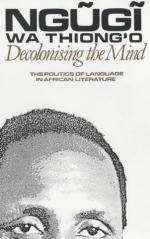
|
| Name: _________________________ | Period: ___________________ |
This test consists of 15 multiple choice questions and 5 short answer questions.
Multiple Choice Questions
1. The chorus in Ngaahika Ndeenda asks where the grave is for whom?
(a) Eskista.
(b) Aduma.
(c) Kpanlogo.
(d) Waiyaki.
2. When was Ngũgĩ wa Thiong’o arrested as a result of the production of Ngaahika Ndeenda?
(a) December 31, 1977.
(b) March 30, 1977.
(c) October 2, 1977.
(d) September 12, 1976.
3. Where did the capitalist powers of Europe carve up the continent of Africa into different colonies in the late 1800s?
(a) Paris.
(b) Amsterdam.
(c) London.
(d) Berlin.
4. In the repeated chorus in the scene from Ngaahika Ndeenda that is presented in the text, the lyrics state that problems can be settled in what?
(a) Blood.
(b) Love.
(c) Jokes.
(d) War.
5. When did Professor Micere Mũgo give a speech in Nairobi entitled "Written Literature and Black Images"?
(a) 1969.
(b) 1975.
(c) 1973.
(d) 1981.
6. Where is the campus of Makerere University College located that the author attended a historic meeting of African writers as described in Chapter 1, Part II?
(a) Kampala, Uganda.
(b) Cairo, Egypt.
(c) London, England.
(d) Nairobi, Kenya.
7. What were largely featured as the main characters in the stories that Ngũgĩ wa Thiong’o grew up listening to as a child?
(a) Women.
(b) Gods.
(c) Goddesses.
(d) Animals.
8. When was This Time Tomorrow written?
(a) 1966.
(b) 1945.
(c) 1972.
(d) 1959.
9. When was The Black Hermit first produced?
(a) 1962.
(b) 1959.
(c) 1969.
(d) 1944.
10. How large was the work force of the Bata shoe factory at the time when Ngaahika Ndeenda was produced?
(a) 1,000.
(b) 5,000.
(c) 2,000.
(d) 3,000.
11. When was Things Fall Apart published?
(a) 1959.
(b) 1969.
(c) 1982.
(d) 1962.
12. Where are the owners of the Bata shoe factory based?
(a) Canada.
(b) Germany.
(c) The United States.
(d) France.
13. Whose perceptions of Africa does the author described in Chapter 1, Part V as "comparable to a land of childhood still enveloped in the dark mantle of the night as far as the development of self-conscious history was concerned" (18)?
(a) Gabriel Okara.
(b) Thomas Jefferson.
(c) Sir H. Rider Haggard.
(d) Georg Wilhelm Friedrich Hegel.
14. When did the author submit The River Between to a writing competition by the East African Literature Bureau?
(a) 1961.
(b) 1989.
(c) 1956.
(d) 1969.
15. What does "Caitaani mutharaba-Ini" translate to in English?
(a) A Meeting in the Dark.
(b) Devil on the Cross.
(c) Mother Sing for Me.
(d) I Will Marry When I Want.
Short Answer Questions
1. Since when does the author state imperialism has affected the lives of even the peasants in the remotest corners of our countries in his Introduction?
2. What was the first school that Ngũgĩ wa Thiong’o attended?
3. Who wrote Catching Them Young?
4. When were Kamĩrĩĩthũ and the other villages around Limuru established?
5. What does the author say the real aim of colonialism was in Chapter 1, Part V?
|
This section contains 430 words (approx. 2 pages at 300 words per page) |

|




